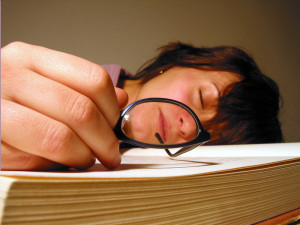 Obstructive sleep apnea, or OSA, describes a sleeping condition during which a patient periodically stops breathing while asleep. An interesting fact about OSA is that, even though the condition is marked by extremely loud snoring, patients with the sleep disorder are often not aware of their condition, and must be prompted to seek treatment (usually by an annoyed sleeping partner). As experts have extensively studied sleep, they’ve learned that snoring and sleep apnea aren’t the only mysteries surrounding the phenomenon. For instance, as patients slumber, their minds and bodies experience changes, classified into different sleep stages. Astoria dentist, Dr. Jeffrey Leibowitz, explains how sleep apnea keeps patients from entering the deep-sleep stage, called rapid eye movement (REM), that the mind and body require to rejuvenate.
Obstructive sleep apnea, or OSA, describes a sleeping condition during which a patient periodically stops breathing while asleep. An interesting fact about OSA is that, even though the condition is marked by extremely loud snoring, patients with the sleep disorder are often not aware of their condition, and must be prompted to seek treatment (usually by an annoyed sleeping partner). As experts have extensively studied sleep, they’ve learned that snoring and sleep apnea aren’t the only mysteries surrounding the phenomenon. For instance, as patients slumber, their minds and bodies experience changes, classified into different sleep stages. Astoria dentist, Dr. Jeffrey Leibowitz, explains how sleep apnea keeps patients from entering the deep-sleep stage, called rapid eye movement (REM), that the mind and body require to rejuvenate.
Proper Rest & Relaxation
- A typical sleep cycle consists of two distinct states; rapid eye movement and non-rapid eye movement. Unlike REM, non-REM occurs in four separate stages, each describing a deeper state of restfulness. REM sleep is typically engaged about 90 minutes after initially falling asleep, and can recur about five times in an eight-hour sleep cycle.
- During REM sleep, which is often referred to as paradoxical sleep, your brain activity is almost as active as when you’re awake, though your muscle responses are paralyzed to prevent acting out your dreams. In some people, this paralysis isn’t entirely effective, and muscles spasms and random movements can occur during REM sleep.
- The first continuous brain recordings to identify and track REM sleep weren’t conducted until 1953. The delay is largely attributed to doctors who were apprehensive about wasting so much paper.
- In 1998, one study baffled experts by suggesting that shining a bright light on the back of patients knees can help reset their sleep cycles. While the advice may have seemed pretty useful at the time to travelers who often passed between time zones, the findings have remained unexplained and controversial.
- Snoring only occurs during non-REM sleep. If you suffer from obstructive sleep apnea, which means that you constantly stop breathing in your sleep due to airway obstruction, then you’re consistently deprived of REM sleep, and can suffer symptoms of sleep deprivation even though you believe you’re sleeping soundly through the night.
About Dr. Leibowitz:
Dr. Jeffrey Leibowitz, a native New Yorker, has served patients and families from Astoria, Queens, Manhattan, Brooklyn, and all surrounding communities since opening his dental practice in 1991. To schedule an appointment at our Astoria dentist’s office, contact us at (718) 728-8320 today.


